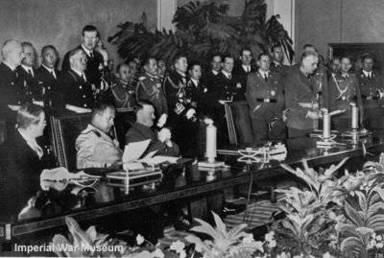The Tripartite Pact

Tripartite Pact signing. Seated on the left starting with Saburo Kurusu, Galeazzo Ciano and Adolf Hitler.
Signed on September 27, 1940 in Berlin, Germany , between Germany, Japan , and Italy
Historyguy.com
The Tripartite Pact

Tripartite Pact signing. Seated on the left starting with Saburo Kurusu, Galeazzo Ciano and Adolf Hitler.
Signed on September 27, 1940 in Berlin, Germany , between Germany, Japan , and Italy
What Was the Tripartite Pact of 1940? This treaty supplemented the pre-existing German-Japanese Agreement and the Anti-Comintern Pact, both signed in 1936, and helped heal a split that formed between Japan and Germany with the Molotov-Ribbentrop Pact signed by Germany and the Soviet Union in 1939.
The Tripartite Pact was later joined by minor Axis powers Hungary (November 20, 1940), Romania (November 23, 1940), Slovakia (November 24, 1940), Bulgaria (March 1, 1941, ), Yugoslavia (March 25, 1941), and Croatia (June 15, 1941). NOTE that both Slovakia and Croatia only came into being due to German occupation of Czechoslovakia (1939) and Yugoslavia (1940). Both Slovakia and Croatia were considered German client-states, and not truly independent nations.
Text of the Tripartite Pact of 1940(English translation) The Tripartite Pact between Japan, Germany, and Italy, 1940
The Governments of Japan, Germany, and Italy consider it the prerequisite of a lasting peace that every nation in the world shall receive the space to which it is entitled. They have, therefore, decided to stand by and cooperate with one another in their efforts in the regions of Europe and Greater East Asia respectively. In doing this it is their prime purpose to establish and maintain a new order of things, calculated to promote the mutual prosperity and welfare of the peoples concerned. It is, furthermore, the desire of the three Governments to extend cooperation to nations in other spheres of the world that are inclined to direct their efforts along lines similar to their own for the purpose of realizing their ultimate object, world peace. Accordingly, the Governments of Japan, Germany and Italy have agreed as follows:
ARTICLE 1. Japan recognizes and respects the leadership of Germany and Italy in the establishment of a new order in Europe.
ARTICLE 2. Germany and Italy recognize and respect the leadership of Japan in the establishment of a new order in Greater East Asia.
ARTICLE 3. Japan, Germany, and Italy agree to cooperate in their efforts on aforesaid lines. They further undertake to assist one another with all political, economic and military means if one of the Contracting Powers is attacked by a Power at present not involved in the European War or in the Japanese-Chinese conflict.
ARTICLE 4. With a view to implementing the present pact, joint technical commissions, to be appointed by the respective Governments of Japan, Germany and Italy, will meet without delay.
ARTICLE 5. Japan, Germany and Italy affirm that the above agreement affects in no way the political status existing at present between each of the three Contracting Powers and Soviet Russia.
ARTICLE 6. The present pact shall become valid immediately upon signature and shall remain in force ten years from the date on which it becomes effective. In due time, before the expiration of said term, the High Contracting Parties shall, at the request of any one of them, enter into negotiations for its renewal.
"The History Guy" is a Registered Trademark.